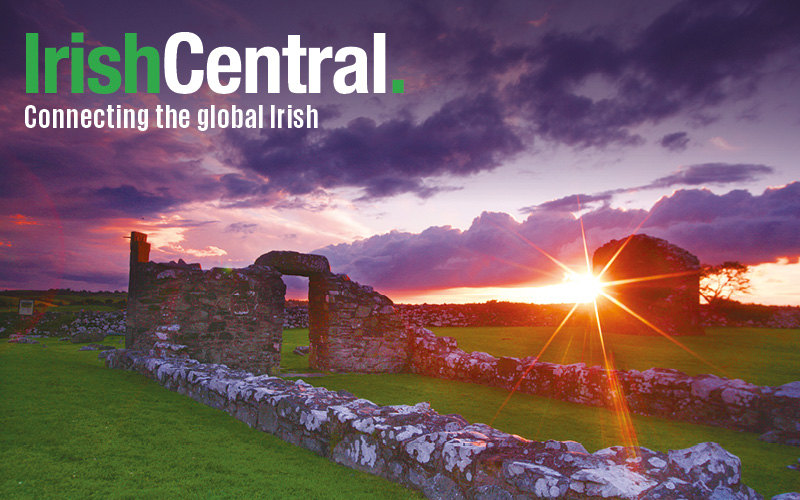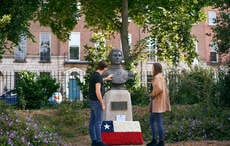A new edition of “Before the Dawn,” the best selling Gerry Adams memoir has just been released by Notre Dame Press. In this exclusive excerpt, Adams tells about his secret wedding day.
(Internment, arresting and abusing thousands of citizens without trial all over Northern Ireland began on August 9, 1971. By the third day Adams and a group of Republicans had taken refuge in Ballymurphy, in the heart of West Belfast.)
"On August 11 the Paras advanced on Ballymurphy, some behind a herd of cattle which they moved in from the fields around, they fired indiscriminately on reaching the houses. Moving through the area, they kicked in doors in every street, took men from their homes, beat them brutally and handcuffed them to railings and fences.
Some men they tied to their Saracens as human shields. By 8.00 am they had the area under total military occupation. Faced with overwhelming odds, and anticipating an all-out assault, the IRA had faded away, leaving a small number of individual volunteers placed throughout the area in relatively safe positions to offer token resistance and to create distractions and diversions.
Read More: Victims' families request new inquest into Ballymurphy massacre
In a house close to the top of Glenalina Road, I and a few other local people sat up all night. To our horror when they came they kicked in the first door in the street and occupied the front bedroom. They skipped the next house. Smashed into another one. Further down the street a woman came to a bedroom window. A British soldier screamed at her, another discharged his rifle. Then there was a burst of shooting. Soldiers clumped together in the front garden of the house we were in. We lay on the floor.
Colette McArdle was with us. “If we get out of this, I’m going to marry you,” I whispered to her.
Read More: Gerry Adams' political journey from 1983
Upstairs we could hear the woman of the house anxiously and stridently hissing at her children not to move.
Outside we heard the running feet of British soldiers, the crashing and screams as they smashed their way into houses, occasional shots. They were into the house next to us. We barely breathed as we heard the thumps and shouts through the dividing wall. Miraculously, they came no closer than the front garden and porch of our house.
After some time the area became deadly quiet. I asked Colette to go out and check the area. She slipped outside.
The quietness continued. Then we heard female voices and footsteps on the path. It was Colette and the other women. She tapped on the window. We nervously let her in.
“It’s OK, they’re away,” she said.
.....In the midst of everything, Colette and I decided that we would get married. There was a war raging all around us; the community was in a state of popular insurrection. Young people like us who were active in the struggle had a sense that we were going to prison or to our deaths; we were being hunted by the British and we could hardly know what the future held for us.
I had come to know Colette early in 1970 when she and her friends had come to a meeting in the Whiterock and I had seen her again a number of times in the weeks and months after that at coordinating meetings for the greater Ballymurphy area. In the first half of 1971 we saw each other more often, but always on political matters; I was keeping company with a number of different girls during this time, all separately!
But in July of 1971, I asked Colette to go out with me, and for the following six weeks we saw each other every single night. Usually we met late at night when I had finished my work and went for a walk around the area or stood or sat outside her front door or on her stairs. Once we went to the pictures. And once in that six-week period we made an arrangement not to see each other. She went out with a friend, but when she returned, I was there anyway, waiting for her.
After this whirlwind six-week courtship, I spoke to Colette’s father, as was the tradition then, nervously asking if I could have his daughter’s hand in marriage. Jimmy McArdle, God rest him, was a good-humored, at times extremely funny little man. He was also extremely reluctant, though he did not say so, to let Colette go. Instead, he gave us his blessing.
My own father was still interned, and indeed I think he was rather upset that we didn’t wait until he was with us, but the spirit of that time was to seize the moment. My mother responded bravely when she realized I was serious about my proposal for marriage.
Read More: Move over, Sam Adams - Chicago brewery introduces beer inspired by Gerry Adams
Our friends bunched up and gave us a few bob, and the day before the wedding Colette went shopping with a friend of mine for shirts, underpants and socks for me. I always thought that Tony (Colette and Gerry’s friend and driver) was very lucky: he was merely driving the car, but for every item that was bought for me, Tony came back with its brother. I got a new shirt, Tony got a new shirt. I got new socks, Tony got new socks. I got new Y-fronts, Tony got new Y-fronts. Tony had been with me the first night I had left Colette home.
We had met by accident in a house where a gang of us came together for a scoraiocht, an informal session of talk and craic and fun. It was July 11, and there were standbys all over nationalist Belfast in case of trouble from the Orangemen.
Afterwards, in the very early hours of the morning, Colette and I and Tony had walked the long road home, up Divis Street, the Falls Road, and up into the White Rock. Tony lived in Beechmount and on some pretext or other, because he was intent on going as far as the Whiterock, we got him to leave us at Beechmount. Then Colette and I had walked the rest of the way up towards her house together. That was the first night that we kissed, as we walked up the Whiterock Hill.
Only a small number of close friends and comrades attended our wedding. At the last moment, and as a security measure, we went to St. John’s chapel on the night before the original date. A number of the lads from Ballymurphy, including our Paddy, scouted out the church, and some of them sat at the top of St. James’s, watching for any possible raid by the British army.
I was at a meeting in Andersonstown up until a few moments before mass was to begin and I dashed to the chapel, arriving late, and making my way down beside Colette in the middle of the ceremony. After the mass, when the church had cleared, we went into the back of the chapel and accompanied by Colette’s brother Paddy and Annemarie, a friend of ours. We were married by Father Des Wilson.
Colette’s mother was in the church, along with two of Colette’s sisters, Maire and Leah, and Leah’s daughter Geraldine. My mother and two of her friends, Annie and Mary Shannon, were in the chapel, too but Jimmy McArdle was too upset to attend. No photographs were taken except one of Colette as she emerged after the wedding ceremony and was presented by Geraldine with a horseshoe.
[The brief honeymoon was in Dublin but Adams had to get back to Belfast]
Read More: Gerry Adams on what must never be forgotten about the 1916 Easter Rising
We stayed that night and the next in the Belvedere [Hotel] before returning to Belfast again. On the day we left, Colette and I stood on the fringe of a large anti-internment protest meeting outside the GPO in O’Connell Street. Our meager funds had dried up, and as we waited for the lift back home we bought one coke between us and I asked the guy in the café for two straws.
That night in Belfast I was back on the run and Colette was back with her mother. When I had first met Colette, I had been drawn to her large green eyes and her ready smile. In the craziness of that time she seemed to be very stable and steady. We talked when we were alone together about everything except politics, and I relished her company. Our short courtship had been conducted mostly on the stairs of her mother’s house, and it was there that I left her on the night we returned from Dublin. Only three nights before, as we sat on those same stairs, on the eve of our wedding, I had warned that ours could not be a normal marriage.
“We’ll work at it,” she had said.
(Gerry and Colette Adams have been married 47 years)
"Before the Dawn" is available from UNDPRESS.ND.EDU or on Amazon.com and bookstores everywhere




Comments